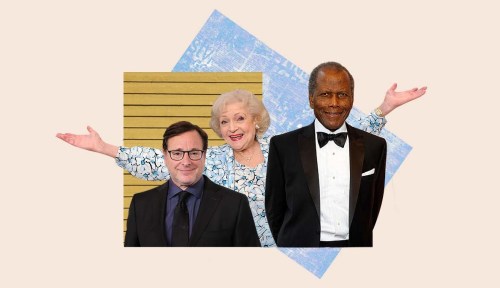When celebrities pass away—and often unexpectedly—the news not only leaves their friends and family members swept up in a cloud of grief, but also a wide swath of their fans. Logically, it doesn’t seem to make a ton of sense to feel sad about losing someone you didn’t personally know—even if you closely followed their successes. But according to psychologists and grief experts, the common reaction of grief following news of celebrity deaths has a clear emotional source, and it’s tied to the way certain public figures take up space in our memories.
Experts in This Article
clinical psychologist and grief counselor living in Seattle, Washington
Natalia Skritskaya, PhD, is the founder and director of The Center for Complicated &
Whether it’s the TV heartthrob we pined over in our youth, the musician who soundtracked our seminal milestones, or the actor so prolific, they became a repeat star in our meme arsenal (we’re looking at you, Betty White), stars can play outsize roles in our lives—which can connect to the magnitude of our reactions to celebrity deaths. To wit, our relationships with celebrities don’t necessarily follow typically understood measures of time and space, making these figures seem subconsciously immortal to us, in a sense. “They’re never supposed to die, and they’re always 25 in our heads,” says Seattle-based therapist and grief counselor Jill Gross, PsyD. “When they die, a little part of us dies, too—our innocence dies with them.”
Still, she says, “anytime we feel grief, it is valid.” So whether Bob Saget or Sidney Poitier’s recent passing affected you, or you can recall the way you felt when you heard about the death of, say, Kobe Bryant, Heath Ledger, or Aaliyah, Luke Perry or Prince, or Anthony Bourdain, understand that your emotions are (or were) absolutely valid. After all, people can impact you even if they don’t know you. “Feelings are important, and they’re not to be ignored,” says clinical psychologist Natalia Skritskaya, PhD of the Center for Complicated Grief at Columbia University’s School of Social Work: “Feelings are signals—if you feel sad about a loss, it’s a signal it had some meaning to you.”
Dr. Gross herself felt the loss of David Bowie when he passed away in 2016. “I grew up with him. He was a big part of my teen and young-adult identity and my love of music,” she says. “There’s a comfort knowing certain people are in the world, and when they’re suddenly not, we have to rearrange the pieces of our life that don’t include them anymore.”
Our relationships with celebrities don’t necessarily follow typically understood measures of time and space, making them seem subconsciously immortal to us, in a sense; they don’t age with us.
As a result, mourning the loss of someone you don’t know (but feel connected to) can look a lot like mourning any other loss. “The same principles apply,” says Dr. Skritskaya, adding that accepting your own reactions may be the key difference when the grief doesn’t feel quite as sensical. “It’s always better to deal with it rather than push it away,” she says.
That often means talking through your feelings—which works even better if you can do so with others navigating similar grief over celebrity deaths. Whether you attend memorials or join online forums, Dr. Gross recommends finding an outlet to connect with others about the person you admired and why they meant so much to you. Furthermore, donating to a charity that the celebrity was passionate about can be a helpful coping and healing mechanism.
But the most powerful thing you can do in the wake of a loss? “Feel your own aliveness,” says Dr. Gross. Maybe that means going on a walk or giving back to your community or taking the solo trip of your dreams—anything to reconnect with your spirit and return to the most vibrant and powerful iteration of your own being.
However, pay close attention to your feelings in case you continue to struggle. “Loss is a stressor and can trigger a number of health and mental-health problems,” Dr. Skritskaya says. If you’re grieving a loss and are showing signs or symptoms of depression, it’s important to seek the help of a mental-health professional.
With reporting by Aly Semigran.
Oh hi! You look like someone who loves free workouts, discounts for cutting-edge wellness brands, and exclusive Well+Good content. Sign up for Well+, our online community of wellness insiders, and unlock your rewards instantly.
Sign Up for Our Daily Newsletter
Get all the latest in wellness, trends, food, fitness, beauty, and more delivered right to your inbox.
Got it, you've been added to our email list.











